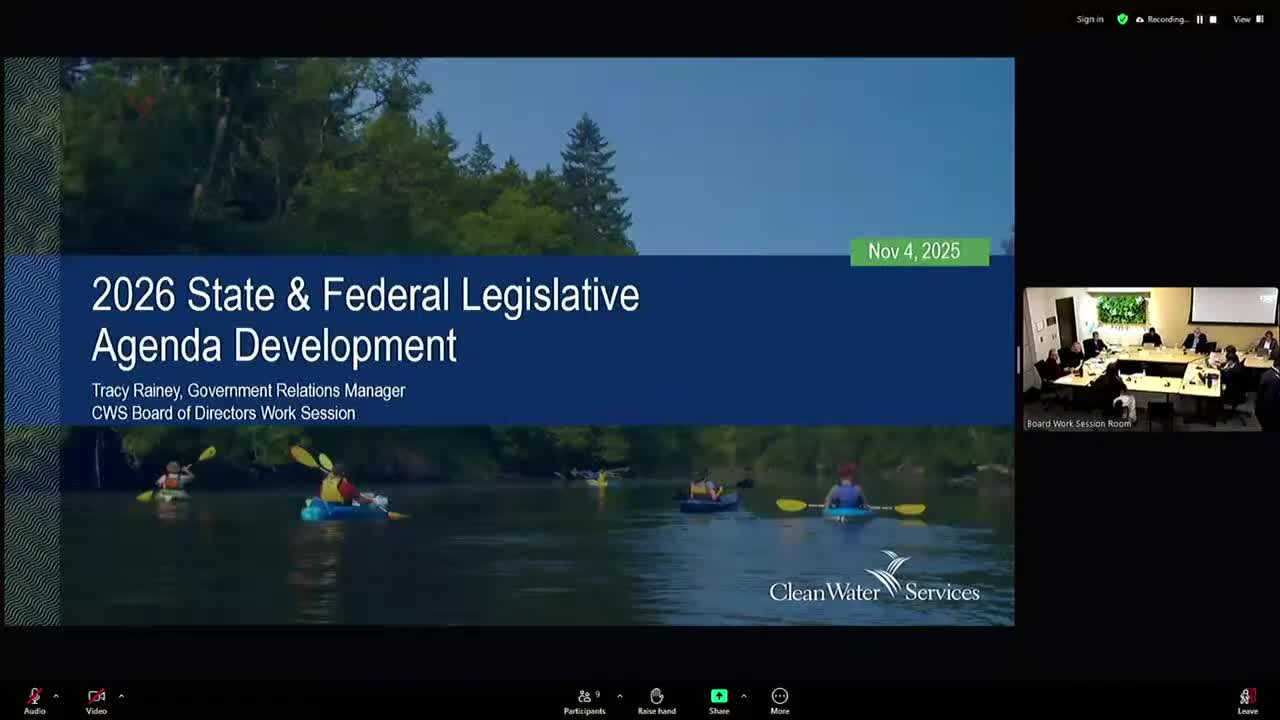Clean Water Services presents federal and state priorities to Washington County board, warns of DEQ budget pressure and PFAS implications
Get AI-powered insights, summaries, and transcripts
Subscribe
Summary
Clean Water Services (CWS) staff outlined 2026 federal and state legislative priorities to the Washington County Board on Nov. 4, emphasizing support for the Clean Water State Revolving Fund, seismic risk mitigation projects, water reuse, low-income water repair assistance and protections against cuts to DEQ. CWS flagged PFAS/emerging contaminant
Clean Water Services (CWS) presented its 2026 federal and state legislative priorities to the Washington County Board of Commissioners on Nov. 4, seeking the board's feedback as state budget conversations and permitting questions proceed.
Tracy Rainey, government relations manager for CWS, said the agency's guiding principles remained broadly consistent with 2025 but that staff made modest textual edits to stress effectiveness, resilience and protection of ratepayers from emerging-contaminant costs. The agenda supports continued and expanded federal investments, opposes cuts to critical funding sources such as the Clean Water State Revolving Fund, and advocates for integrated planning approaches to resilience and permitting efficiency.
CWS also highlighted several federal and state priorities: advancing seismic-strengthening work on SCOG and STAM projects to reduce risk from a Cascadia Subduction event; advancing water reuse policies; seeking permanence or expanded funding for low-income water repair assistance originally created during the COVID period; nonreductions to stormwater capacity funding; and funding to support maintenance and operations at the Wapato Lake National Wildlife Refuge because of downstream water-quality benefits.
PFAS and emerging contaminants: Rainey said CWS will press for policies that protect environment and public health while promoting a producer-responsibility approach to avoid shifting cleanup costs to utility ratepayers. "Advocating for policies, regulations protective on the environment and human health from exposure to emerging contaminants," Rainey said, referencing PFAS among other substances.
Permitting and DEQ budget concerns: Commissioners asked whether permitting changes or regulatory tightening were imminent and whether DEQ budget reductions could impair permit writers and water-quality standards development. CWS staff said many technical permitting changes are negotiated with DEQ and that protecting DEQ staffing and resources in the state budget is critical to avoid slowing permit processing or undermining long-term regulatory work. Staff reported DEQ had been asked to submit 5% cut lists and that CWS would watch those proposals closely.
Workforce and other priorities: CWS also proposed elevating water-workforce issues and exploring a resolution recognizing the water workforce'a potential coalition effort with city and special-district partners. The agency flagged housing-production policy as an area where state action should preserve water-quality protections.
What the board asked for: Commissioners requested follow-up on permitting timelines, the status of the state septic-loan program, and how federal or state rules might affect efforts such as renewable natural gas projects. CWS staff said they would provide additional briefings and maintain communications with elected officials and agency partners when matters require direct board engagement.
